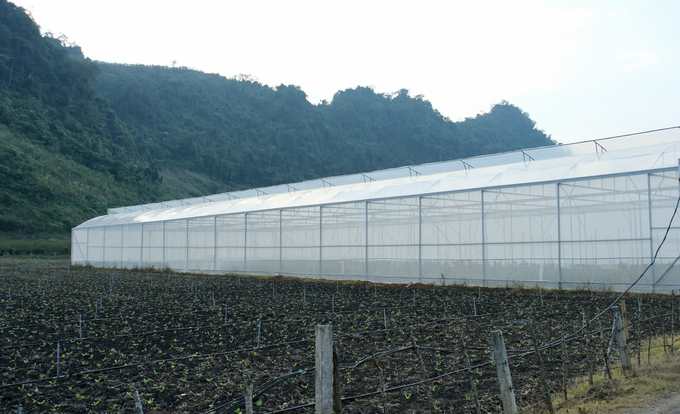May 30, 2025 | 05:12 GMT +7
May 30, 2025 | 05:12 GMT +7
Hotline: 0913.378.918
May 30, 2025 | 05:12 GMT +7
Hotline: 0913.378.918

Son La has several sub-climatic zones ideal for developing temperate fruit and vegetable production. Photo: Quynh Chi.
Located in the northern mountainous region, Son La has diverse natural conditions and multiple climate zones, making it suitable for growing both tropical and temperate crops. In areas such as Mai Son and Yen Chau, the climate supports the cultivation of tropical fruit trees like bananas, pineapples, and mangoes.
Furthermore, Son La features temperate climate zones that are ideal for growing specialized crops, particularly vegetables and fruits. A prime example is the Moc Chau Plateau, which, with its favorable soil and climate conditions, has become a hub for concentrated vegetable production. This vegetable zone not only meets local demand but also supplies major cities like Hanoi, and even other regional markets.
One of Son La's key advantages lies in its varied weather conditions. While summer in the delta provinces makes it difficult to grow temperate vegetables such as tomatoes, cabbage, and Chinese cabbage, Moc Chau in Son La can produce these crops year-round.
The development of concentrated vegetable production areas in Moc Chau not only diversifies supply sources for large markets but also significantly reduces transportation costs. Instead of transporting vegetables from Da Lat to Hanoi, Moc Chau is just about 200 kilometers away, making it a more convenient and cost-effective option. This geographical advantage positions Moc Chau as an ideal location for vegetable production, especially high-tech cultivation in greenhouses and net houses.
Moreover, establishing a concentrated vegetable production zone in Son La brings considerable benefits in reducing the import of vegetables such as carrots and potatoes from China. This strategy enhances agricultural self-sufficiency, boosts the local economy, and helps raise the profile of Son La's agricultural products on the national stage.
Translated by Quynh Chi
/2025/05/25/4127-3-073637_820.jpg)
(VAN) Thanks to the promotion from an FAO-implemented project, vegetable production in greenhouses in Moc Chau has seen strong development, from 1.5 hectares in 2021 to nearly 50 hectares in 2024.

(VAN) FAO has recently supported USD 140,000 to implement the project 'Risk mitigation human-animal interface risks through disease control initiatives in pig farming.'

(VAN) The People's Committee of Tra Vinh province has approved an adjustment to the investment policy for the Green Hydrogen Plant project, increasing its area to approximately 52.76 hectares.
![Reducing emissions from rice fields: [2] Farmers’ commitment to the soil](https://t.ex-cdn.com/nongnghiepmoitruong.vn/608w/files/news/2025/05/05/dsc08881jpg-nongnghiep-140632.jpg)
(VAN) Clean rice cultivation model in Thuong Tan commune, Bac Tan Uyen district, is assisting local residents in achieving sustainable agriculture by substantially reducing costs, increasing productivity, and protecting the environment.

(VAN) At the conference to disseminate Resolution No. 68, AgriS introduced its digital agricultural ecosystem and reaffirmed its commitment to accompanying the Government in promoting private sector development and sustainable agriculture.

(VAN) 'Blue Ocean - Blue Foods' initiative is designed to restore marine ecosystems and establish sustainable livelihoods for local communities by cultivating a minimum of 1,000 hectares of cottonii seaweed in the first three years.
/2025/05/21/4642-3-112707_603.jpg)
(VAN) The V-SCOPE project has made direct contributions to three out of six pillars of the Comprehensive Strategic Partnership between Vietnam and Australia.